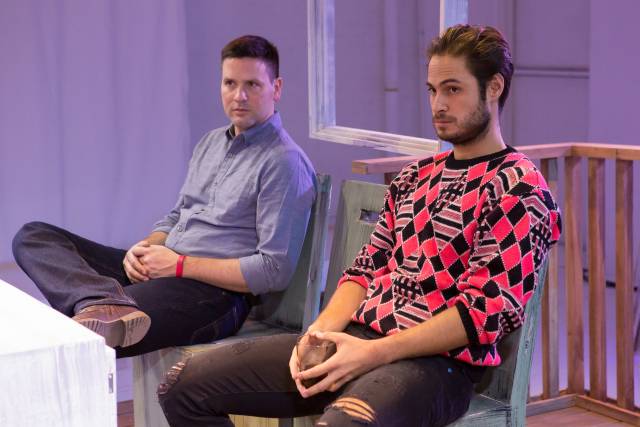

A decade or so from now—if books still exist—some publisher may release an anthology: Essential Plays from the Trump Era. God knows what the future’s passionate and witty playwrights will create from whatever slouches its way out of D.C. in the next four years. But we already have one candidate for this imaginary tome in Dan Fingerman’s Boys of a Certain Age. It’s set at this very moment in time, just a few weeks into Trump’s regime. (Boys was originally staged at the Fresh Fruit Festival last June, so Fingerman and director Dan Dinero are either spot-on latter-day Nostradamuses or they have done some quick tinkering with the script in recent weeks.)
The play centers on four gay men—three Jewish, one half-Jewish—from New York City who gather at a nearby beach resort in the dead of winter. Ira (R. Scott Williams) and Larry (Joseph J. Menino) are the “elder gays.” Joining them are Ira’s conservative-leaning nephew, Christopher (Brian Gligor), and Larry’s so-progressive-it-hurts son, Bryan (Marc Sinoway). (Larry had led a closeted life while married to Bryan’s mother, who has recently died.)
The secret-studded backstories of these characters would be enough to cause fur to fly, even without any angst about the New American Order simmering in the background. But only a few minutes into the play, characters are spewing politically flavored vitriol at one another, much of it centered on things Trump. Bryan is particularly dismissive of Christopher, whom he writes off as a privileged cisgender white male (even though Bryan himself shares that very identity). But, truly, none of the characters seems fully allied with any other. Bryan is virtually estranged from father Larry. Ira is horrified by Christopher’s politics. And Larry and Ira have decades-old conflicts that don’t take long to surface.

The play consists of a number of short scenes, some only a few seconds long—which creates a cinematic quality. This would be more effective if the scene changes happened more quickly. In a few places, characters address the audience directly—something that would likely work better if it were employed more frequently. But these are minor issues. Fingerman’s script is likable and often quite funny. The last major scene between Ira and Larry is especially thoughtful and well crafted.
The cast is solid. Ira has some of the best comic lines, and Williams delivers them with campy flair. At first Larry seems merely a floundering nebbish, but as the show progresses, Menino beautifully shows his intelligence and moral fortitude. As Bryan, Sinoway finds the right mix of smugness and vulnerability. And Gligor’s feisty, earnest approach helps make right-winger Christopher palatable, even to viewers who find the character's politics abhorrent.